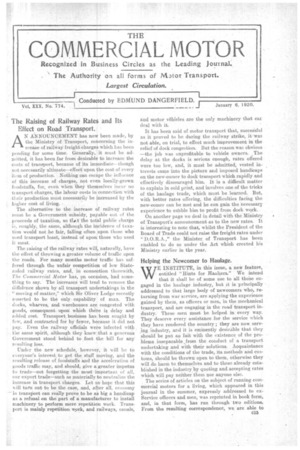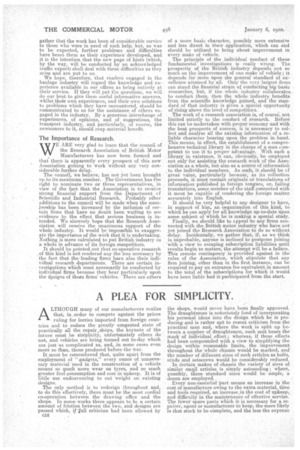COMMERCIAL MOTOR
Page 1

Page 2

If you've noticed an error in this article please click here to report it so we can fix it.
Recognized in Business Circles as the Leading Journal.
The Authority on all forms of Motor Transport. Largest Circulation.
The Raising of Railway Rates and Its Effect on Road Transport. AN ANNOUNCEMENT has now been made, by the Ministry of Transport, concerning the increase of railway freight charges which has been ' pending for some time. Generally, it must be admitted, it has been far from desirable to increase the costs of transport, because of its immediate—though not necessarily ultimate—effect upon the cost of every item of production. Nothing can escape the influence of this increase of charges, not even locally-grown foodstuffs, for, even when they themselves incurno tiansport charges, the labour oasts in connection with -their production must necessarily be increased by the higher cost of living. ‘ .
The alternative to the increase of railway rates must be a, Government subsidy, payable out of the proceeds of taxation, so tle.t the total public charge is, roughly, the same, although the incidence of taxation would not be fair, falling often upon those who used transport least, instead of upon those who used it most. .
The raising of the railway rates will, naturally, have the effect of throwing agreater volume of traffic upon the roads. For many months motor traffic has suffered through the unfair competition of low Stateaided railway .rates, and, in connection therewith, The Commercial Motor has, on occasion, had some. thing to say. The inereases will tend to remove the diffidence shown by all transport undertakings in the "moving ofnaatter," which Sir Oliver Lodge recently asserted to be the only. capability of man. The docks, wharves, and warehouses are congested with goods., consequent upon which there ia delay and added cost. Transport business has been sought by few, and contracted for by fewer, because it did not pay. Even the railway officials were infected with . the same spirit, although they knew that a generons . Government stood behind to foot the bill for any resulting loss.
Under the new schedule, however, it will be to everyone's interest to get the stuff moving, and the • resulting release of foodstuffs and the acceleration of goods traffic may, and should, give a greater impetus to trade—not forgetting the most important of all, our export trade—such as materially to neutralize the increase in transport charges. Let .us hope that this will turn out to be the case, and, after all, economy in transport can really prove to be as big a handicap as a refusal on the part of a manufacturer to install machinery to perform mere repetition work. Transport is mainly repetition work, and railways, canals, and motor vaicles are the only machinery that car deal with it.
It has been said of motor transport that, successful as it proved to be during the railway strike, it was not able, on trial, to effect much improvement in the relief of dock congestion. But the reason was obvious —the job was unprofitable to vehicle owners.delay at the docks is serious enough, rates oered were too low,. and, it must be admitted, vested interests came into the picture and imposed handicaps on the new-coiner to dock transport which rapidly and effectively discouraged him. It is a difficult matter to explain in cold print, and involves one of the tricks of the haulage trade, which must be learned. But, with better rates offering, the difficulties facing the new-comer can be met and he can gain the necessary experience to enable him to profit from dock work.
On another page we deal in detail With the Ministry of Transport's announcement as to the new rates. It is interesting to note that, whilst the President of the Board of Trade could not raise the freight rates under "D.O.R.A.," the Minister of Transport has been enabled to do so under the Act which created his Ministry earlier in the year.
Helping the Newcomer to Haulage.
WEINSTITUTE, in this issue, a new feature, entitled "Hints for Hauliers." We intend that it shall be of some use to all tho'se engaged in the haulage industry, but it ia principally addressed to that large body of newcomers who, returning from war service, are applying the experience gained by them, as officers or men, in the mechanical transport, and are engaging in the road transport industry. These men must be helped in every way. They -deserve every assistance for the service which they have rendered the country; they are now. serving industry, and it is eminently deairalale that they should be put an fait with the existence of the problems ioseparable from the conduct of a transport undertaking and with their solutions. Acquaintance with the conditions of the trade, its methods and customs, should be thrown open to them, otherwise they will do harm to themselves and to those already established in the industry by quoting and, accepting rates which will pay neither them nor anyone else.
The series of articles on the subject of running commercial motors for a living, which appeared in this journal in the summer, expressly addressed to exService officers and men, was reprinted in book forth, and, in that form, has run through ' two editions. From the resulting correspondence, we are able to gather that the work has been of considerable service to those who were in need of such help; but, as was to be expected, further problems and difficulties have beset them as their experience • developed, and it is the intention that the new page of hints (which, by the way, will be conducted by an acknowledged traffic expert) shall deal with these difficulties as they arise and are nut to us.
We hope, therefore, that readers engaged in the haulage industry will regard the knowledge and experience available in our officet as being entirely at their service. If they will put the questions, we Will do our best to give them useful informative answers, whilst their own experiences, and their own solutions to problems *hieh they have encountered, ahould be communicated to us for the assistance of others engaged in the industry. By a generous interchange of experiences, of opinions, and of suggestions, the transport • industry, and particularly, of course, the newcomers to it, should reap material benefit.
The Importance of Research.
WE ARE very glad to learn that the douncil of the Research Association of British Motor
. Manufacturers has now been formed and that there is apparently every prospect of this new Association getting to work without any very con.siderable further delay. The counoil, we believe, has not Yet been brought up to its maximum number. The Government has the right to nominate two or three representatives, in view of the fact that the Association is to receive Strong financial support from the Pepartment a Scientific and Industrial Research. Probably other additions to the council will be made when the mem)uership has been increased by the inClusion of certain firms that have no doubt been waiting to see , evidence to the effect that serious business is intended. We sincerely hope that the Research Association will receive the unanimous support of the whole industry. It would be impossible to exaggerate the importance of the work that it is undertaking. Nothing is More calculated to put British industry as a Whole in advance of its foreign competitor's, It should be pointed. out that co-operative research of this kind is not rendered any the less necessary by the fact that thelea hare ding 'firms he also . their research departments. There are Certain in vestigations which must necessarily be conducted by individual firms because they bear particularly upon the designs of those firms' vehicles. 'There are others
of a more basic character, possibly more extensive and less direct in their application, which can and should be utilized to bring about improvement in every make of vehicle.
The principle of the individual conduct of these. fundamental investigations is really wrong. The prosperity of the British industry depends not so much on the improvement of one make of vehicle;. it depends far more upon the general standard of exCellence attained by all. Only the very largest firms can stand the financial strain of concluCting big basic researches, but, if the whole industry collaborates to conduct them, then the whole industry benefits from the scientific knowledge gained, and the standard of that industry is given a special opportunity of rising above the level of competitors.
The work of a research association is, of course, not limited strictly to the conduct of research. Before this can be undertaken with proper economy and with the best prospects of success, it is necessary to collect and analyse all the existing information of a reliable character bearing upon the problem in hand. This means, in effect, the establishment of a comprehensive technical library in the charge of a man tompetent to use it to proper advantage. With such a library in existence, it can, obviously, be employed not only for assisting the research work of the Association as a whole, but also as a source of information to the individual members. As such, it should be of great value, particularly because, as its collection proceeds, it must contain originals or translations of information published in foreign tongues, or, failing translations, some member of the staff connected with it mast be capable of rendering the foreign matter accurately. into English.
It should be very helpful to any designer to have, in support of him, an organization of this. kind, to which he can apply for all knowledge up-to-date upon some subject of which he is making a special study.
Finally, we should like to appeal to any firms eonfleeted with the British motor industry who have not yet joined the Research Association to do so without delay. Incidentally, we gather that, if, as we think is improbable, anyone is inclined to postpone joining with a view to escaping subscription liabilities until results begin to mature, the attempt will be a failure. This remote contingency is -provided against in the rules of the Association, which stipulate that any i firm joining, other than n the first instance, can be required to pay an entrance fee equivalent in amount to the total of the subscriptions for which it would have been liable had it participated from the start.


























